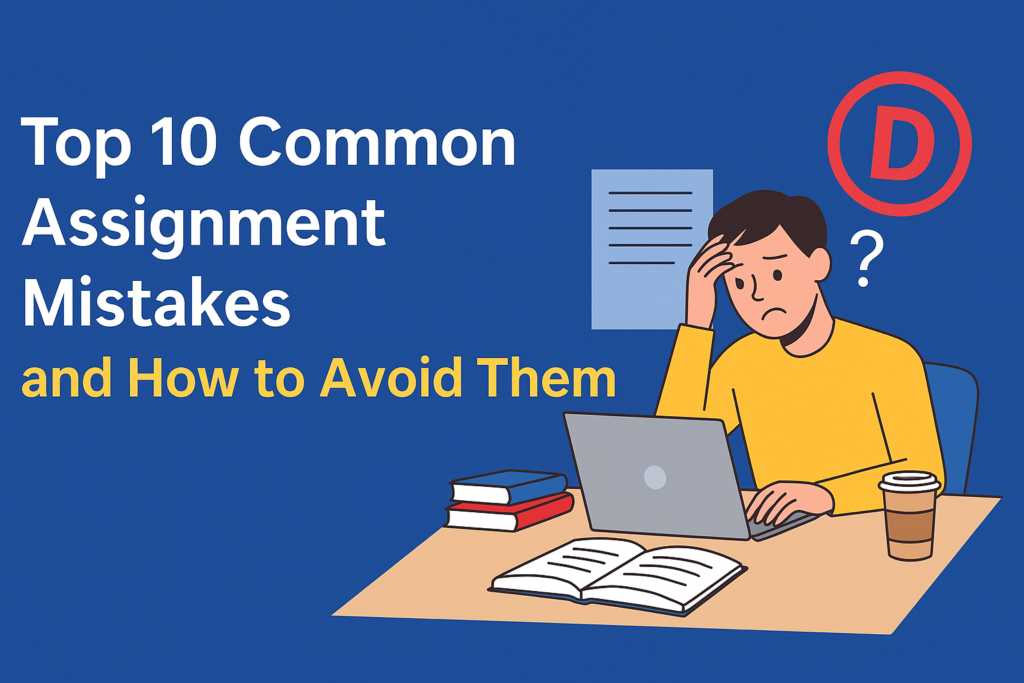Top 10 Common Assignment Mistakes and How to Avoid Them

🎓 Assignments are your golden ticket to academic success. Yet, many students unknowingly lose marks because of small but avoidable mistakes. Whether you’re a local student or an international learner in Australia or New Zealand, this guide is your shortcut to writing better assignments and scoring higher grades.
Let’s explore the top 10 most common assignment mistakes—and how to fix them fast!

Understanding the assignment brief is the first key to success.
✅ 1. Misunderstanding the Assignment Question
Many students dive into writing without truly understanding the task. This often leads to off-topic content—even if it’s well-written.
🔍 How to Fix It:
- Carefully read the instructions
- Highlight keywords like explain, compare, or critically analyse
- Check the assignment rubric for expectations
- Ask your tutor if anything is unclear
📖 Related: How to Write a High-Distinction Assignment
✅ 2. No Clear Structure
Your assignment should have a clear introduction, body, and conclusion. Without it, your ideas may seem jumbled and hard to follow.
🛠 Pro Tip:
- Use headings and subheadings
- Each paragraph should have one main idea
- Make sure there’s a logical flow
✅ 3. Poor Time Management
Last-minute writing = rushed work, shallow research, and more errors.
🔔 Avoid This By:
- Starting early (at least a week before it’s due)
- Setting mini-deadlines for each section
- Using tools like Notion, Trello, or Google Calendar
✅ 4. Copy-Pasting Without Paraphrasing
Plagiarism—even accidental—is a serious academic offence.
✅ Fix This:
- Always write in your own words
- Quote and cite sources properly
- Use plagiarism checkers like Grammarly or Turnitin
📖 Need help? Get plagiarism-free assignment help here
✅ 5. Weak Introduction or Conclusion
The intro sets the tone; the conclusion leaves the final impression.
🚀 Improve It By:
- Outlining your main argument early
- Summarising key points in your conclusion
- Avoiding new information at the end
✅ 6. Incorrect Referencing
Incorrect citation = lost marks (and even academic penalties).
📚 How to Get It Right:
- Know your required referencing style (APA, Harvard, etc.)
- Use citation tools, but always double-check
- Include both in-text citations AND a reference list
📖 Need it perfect? Use our editing and referencing service
✅ 7. Overusing Passive Voice
Too much passive voice can make your writing sound weak and impersonal.
🛠 Fix It By:
- Using active voice wherever possible
- Keeping sentences direct and strong
- Example: “The results show…” instead of “It is shown that…”
✅ 8. Lack of Critical Thinking
Assignments aren’t just about repeating facts. Your own analysis is what gets you a high distinction.
🧠 Try This:
- Compare viewpoints
- Add your opinion based on evidence
- Don’t just describe—critique and analyse
✅ 9. Ignoring the Word Count
Going too far under or over the word limit often leads to penalties.
📏 Keep It Right:
- Stay within 10% of the word count
- Remove fluff if you’re over
- Add relevant evidence or examples if you’re under
✅ 10. Not Proofreading Before Submitting
Spelling and grammar mistakes are easy to miss—but they will cost you marks.
🔍 Fix It:
- Read your assignment out loud
- Use tools like Grammarly or Hemingway Editor
- Ask a friend or use a professional proofreader
🎓 Final Thoughts
Most assignment mistakes are easy to fix once you’re aware of them. By following this guide, you’ll write more confidently and avoid errors that cost you marks.
Need help from expert academic writers?
✅ Contact us today for:
- Assignment writing
- Editing and referencing
- Fast delivery with zero plagiarism
🧾 Quick Checklist: Common Assignment Mistakes
| Mistake | How to Avoid It |
|---|---|
| Misunderstanding the brief | Read carefully, highlight keywords |
| No structure | Use headings, outline your argument |
| Rushed writing | Plan and start early |
| Plagiarism | Paraphrase and cite sources |
| Weak intro/conclusion | Start and finish strong |
| Bad referencing | Use the correct citation style |
| Passive writing | Use active voice |
| No analysis | Critically engage with the topic |
| Wrong word count | Edit smartly, keep it within limits |
| No proofreading | Always review before submitting |
💬 What Next?
👍 Bookmark this blog
🔁 Share it with your classmates
📬 Subscribe for more weekly tips!